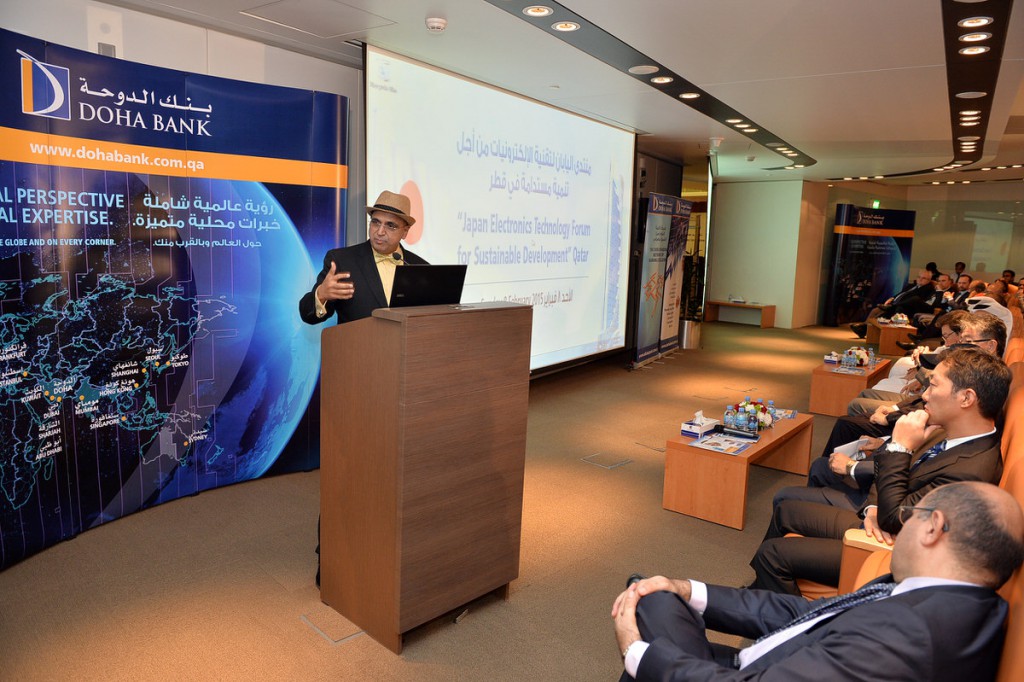- Business and government leaders discuss how Japanese technologies can help Qatar achieve its National Vision 2030 targets
- Japanese Ambassador to Qatar H.E. Shingo Tsuda and QCCI Director General Remy Rowhani preside over the conference as Chief Guests
Doha Bank yesterday hosted a technology conference featuring top Japanese business leaders and government officials to discuss ways in which advanced Japanese technologies can be leveraged to promote sustainable development in Qatar. Held at Doha Bank Tower, the conference was presided over by H.E. Shingo Tsuda, Japanese Ambassador to Qatar, and Remy Rowhani, Director General of the Qatar Chamber of Commerce and Industry (QCCI).
Titled “Japan Electronics Technology Forum for Sustainable Development of Qatar”, the conference was attended by senior executives from a number of leading Japanese IT and electronics companies including Fujitsu, Sharp, ODELIC, NEC Corporation, Terumo, Nihon Kohden, Endo Lighting, Kyoritsu, and Nagase.

Dr. R. Seetharaman, Group CEO of Doha Bank, emphasized the unique and extraordinary bilateral relationship between Japan and Qatar. He said, “Japan was among the first countries to recognize Qatar, and was also the first country to identify the sizeable market opportunities presented by this small nation. Japan was the first LNG buyer from Qatar and remains one of the largest importers of Qatari LNG in the world. Bilateral trade between Japan and Qatar today is more than USD 38 billion, which reflects the strengthening trade and economic bonds between the two nations. Japan – A friend Indeed for Qatar. Japanese companies are known for their ability to anticipate and act upon changes in market conditions and requirements, and are renowned worldwide for their technology leadership and innovation. In Dec 2014 the Government of Japan and the Government of the State of Qatar have agreed on Avoidance of Double Taxation and the Prevention of Fiscal Evasion with respect to Taxes on Income. The GCC- Japan free trade still under negotiations.”
Remy Rowhani in his address recalled his long association with Japan and Japanese organizations. ‘When I was a young man, I started my professional training with the Japanese, and I’ve always been struck by the inherent concept of humility within the Japanese culture. Humility is what brings people together; peace and security of the mankind is unattainable unless its unity is firmly established. And this is where the Japanese show the way for the rest of us.”
Mohamed Abouda, Director – Public Safety Business at Tokyo-headquartered NEC Corporation, shared insights on how NEC is building safe and secure societies around the world by harnessing the power of Information and Communications Technologies (ICT). Through offering global solutions and next-generation network technologies for seven domains of “Safer Cities”, NEC, Abouda said, is integrating technology and expertise in an unprecedented manner to create the ICT-enabled society of tomorrow, thus contributing to greater safety, security and efficiency and enabling people to live brighter lives.
Miura Takatoshi, Director of Information and Communications – Electronics at the Japanese Ministry of Economy, Trade and Industry (METI), said, “Japan and Qatar have strong relations in the field of energy, and we are very eager to further develop our strategic partnership by broadening our cooperation into newer areas. IT and electronics, which I’m in charge of at METI, is a high value-added industry that offers unlimited applications in various growth fields such as energy, infrastructure, agriculture, healthcare, education, automobile and other industries, and in Japan, the IT and electronics industry creates more than one million jobs annually. The Qatar National Vision 2030 encompasses social, economic, human and environmental development as its four pillars, and I’m sure the ambitious targets that Qatar has set for itself can be achieved with the support of advanced Japanese technologies.”
Aiham Al-Akhras, Head of Business Development & Operations at Fujitsu, highlighted the innovative ways in which Fujitsu is combining its extensive experience in technology and manufacturing with the power of ICT to shape the future of its customers and the society at large. Stressing on the social challenges presented by population growth and environmental impact, Al-Akhras said that, by 2030, the world’s population will reach 8.3 billion pushing up the environmental impact to two times the Earth’s ability to absorb it. To address this challenge, he added, it is imperative that we adopt Smart City solutions and embrace human-centric innovation that empowers people with human-centric ICT to create business and social value.
The largest private commercial bank in Qatar, Doha Bank is one of the leading financial services companies in the Gulf region. The Bank provides individuals and commercial, corporate and institutional clients across Qatar and the region, new and better ways to manage their financial lives.



